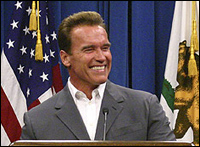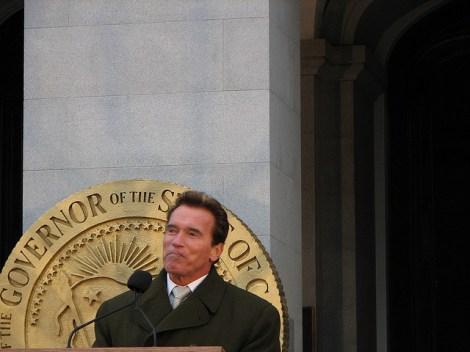Arnold Schwarzenegger (hereafter, “Arnold”) has long championed environmental action. He recently announced that he planned to spend his post-political life fighting climate change. And yet, in an interview with Politico, he says he supports building Keystone XL.
Schwarzenegger isn’t likely to win over the environmental community with his position on the Keystone XL oil pipeline, which Obama is expected to decide on early next year.
“In general, I’m all for it,” Schwarzenegger said. “I think that I’d rather get the energy from Canada than get it from the Middle East.”
Hm.
Let me tell you how Arnold became governor of the state of California. In 2003, California was one year into the second term of a fairly milquetoast Democratic governor, Gray Davis. He won reelection in 2002 because the Republican party successfully convinced Bill Simon, the least-likeable person in California, to run against him. (Well, Davis helped, by attacking the bejesus out of Simon’s primary opponents.) So California kind of shrugged and reelected the guy.
But in 2003, a few things happened. First, the state of California continued its attempts to go completely broke, a process begun by unwitting voters in 1978. This prompted Davis to reinstate a hefty fee for people registering their cars, which wasn’t popular. And later in the year, the state wasn’t able to provide enough electricity to meet demand, due to various reasons some of which rhyme with “Benron.” The pre-planned brownouts reinforced the perception that the state wasn’t working right. People were mad.
Enter car-alarm magnate and U.S. Rep. Darrell Issa (R-Calif.). Issa, who had scads of money because he invented that annoying combination of sounds (“anh anh anh anh bee ooo bee ooo bee ooo woooooop wooooop,” etc.), decided he might want to be governor. As part of the reforms implemented during the Progressive era a century ago, California had a process allowing for a state official to be recalled from office. (Those reforms also spawned the initiative process, which is why the state budget was broken in the first place.) So Issa started a campaign, in concert with some Southern California radio talk show hosts, to recall Gray Davis. It worked. The recall was on the ballot for October 2003.
For years, Arnold had toyed with running for office. (Surprising, given that his career was predicated on playing hyper-powerful men.) What prevented him from doing so was his not-exactly-wholesome past: steroid use off-camera, marijuana use on, reported and demonstrated inappropriateness with women. But Arnold was tailor-made for the recall election. The vote had two parts: First, whether Gray Davis should be removed from office, and second, who should replace him if he was. This favored someone with a high name recognition. And the short run-up to the election minimized the chances that Arnold would have to answer tough questions, and meant limited time for deep dives into his background. Remember how Donald Trump led the Republican 2012 field for a while? Imagine if the election had abruptly happened toward the peak of that popularity. That was the good luck that Arnold enjoyed. So Davis was recalled and Arnold won handily.
Here’s a little secret about being an elected official: It sucks. Every elected official who isn’t president is always negotiating a high wire between two frustrated constituencies. The job is about boring dinners and boring legislation and boring pandering. Opportunities for leadership are few. To be fair, Arnold had more pizzazz in the role than most, in part because of his fuck-it-who-cares attitude. Can’t smoke cigars in the Capitol building? Fine, Governor Arnold will put up a tent in a featureless interior courtyard and smoke in there. That sort of thing. He wasn’t a great governor, but he was memorable and interesting, and in a state like California, that was enough. In 2006, he went up for reelection against the Democrats’ most boring possible candidate, and beat him silly. (Figuratively.) Four years later, politician Arnold was done.
Because what Arnold always liked was running things, calling the shots, making the rules. He didn’t want to become a senator or a member of the House; there, he’d just be running with the pack. Arnold wants to point at shit and see it blow up, boom. This new iteration, Arnold as activist, fits that better than anything else. He has a ton of money, thanks to your enthusiasm for The Terminator, and all the time in the world. So he’s found a space where he can call the shots and still be the biggest guy in the room: environmentalism.
While governor, Arnold’s pro-green work was primarily of the let’s-make-California-number-one-in-green-research-and-investment school. It was the business side of environmentalism. There’s a market in renewables and in developing products, and that’s good for all comers. Arnold is, after all, a Republican, taking a market-based Republican approach to the problem of global warming.
And that’s why he doesn’t care about Keystone. Arnold wants America to win. To chomp a cigar in its teeth and piss on China in everything — energy production, cutting the hell out of our pollution, having the coolest solar tech, whatever. Fuck the world, we’re pumped up and kicking ass. He is not sitting down with Bill McKibben and working through the math, he’s going rock-climbing with CEOs and figuring out how to dominate. For Arnold, Keystone is just a thing outside this competition, except that it lets us tell the Middle East to go to Hell. Fine. Build that pipeline. Because we’re going to beat you at the game we want to play.
With Arnold, you don’t have an environmentalist, not really. You have a deeply competitive man who wants to win, and sees green industry as a place to make that happen. Sierra Club, NRDC: you will not want him to speak at your convention, probably, because he’ll say things to make you mad both intentionally and unintentionally. Arnold wants to lead, not to change the world.
At various points during his governorship, Arnold fantasized about running for president. In 2010, during an appearance on Leno (the same place he announced his plans to run for governor), Arnold suggested that he would “without a doubt” run for President. Unfortunately for the Austrian-born actor, the Constitution prevents those not born as naturalized citizens from holding that office. We can thank the Founding Fathers for preventing President Schwarzenegger. But we can also lament that this leaves us with Arnold Schwarzenegger, “green activist.”



